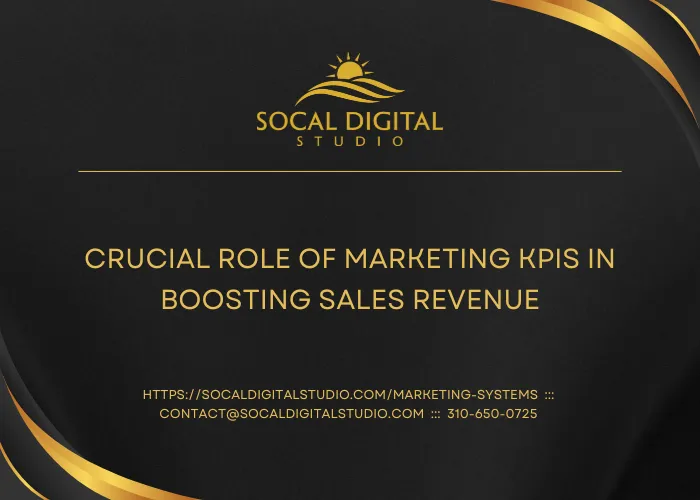PROPELLING SUCCESSFUL BUSINESSES
Actionable Best Practices

Crucial Role of Marketing KPIs in Boosting Sales Revenue
“The greatest value of a picture is when it forces us to notice what we never expected to see” – John Tukey
Introduction
In the ever-evolving business landscape, the ability to measure the impact of marketing strategies through key performance indicators (KPIs) is not just valuable, it’s essential. Marketing KPIs provide a quantifiable metric that businesses can use to evaluate the efficiency of their marketing campaigns in real-time, adjust strategies promptly, and enhance decision-making processes. Ultimately, these metrics are crucial for growing sales revenue. This article explores the importance of these indicators, how they connect to sales performance, and which KPIs are must-haves for any growth-focused company.

Data-Driven Decisions
In today’s data-driven era, intuition and guesswork are no longer sufficient for making marketing decisions. Marketing KPIs offer concrete data that helps businesses understand what works, what doesn’t, and where there are opportunities for improvement. By analyzing these metrics, companies can optimize their marketing spend, enhance their strategies, and increase overall efficiency, all of which are essential for maximizing sales revenue.
Strategic Alignment
Marketing KPIs help ensure that a company’s marketing goals are aligned with its broader business objectives. This alignment is crucial for coherent business growth, as it enables teams to focus their efforts on strategies that directly impact the company’s goals, particularly sales enhancement.
Quick Adaptability
The competitive market landscape can change rapidly. Businesses that can quickly adapt by monitoring KPIs are able to pivot their strategies in response to real-time data, staying ahead of market trends and competitor moves. This agility can be a significant competitive advantage.
Key Marketing KPIs to Drive Sales Revenue
To effectively drive sales revenue, focusing on certain KPIs can help refine strategies and boost outcomes. Here are some essential marketing KPIs that companies should monitor:
Lead Conversion Rates
This KPI measures the percentage of leads that convert into customers. High conversion rates typically indicate effective marketing tactics and qualified lead generation, which directly contribute to increased sales revenue.
Customer Acquisition Cost (CAC)
CAC is the total cost associated with acquiring a new customer, including all marketing and sales expenses. Reducing CAC while maintaining or increasing the quality of customer acquisitions boosts profitability.
Customer Lifetime Value (CLV)
Understanding the total revenue a company can expect from a single customer throughout their relationship can help in prioritizing marketing resources and fostering customer relationships that maximize long-term revenue.
Return on Marketing Investment (ROMI)
ROMI highlights the profitability of marketing campaigns. By comparing the revenue generated from marketing activities against the costs, companies can identify the most and least efficient strategies in terms of revenue growth.
Implementing KPIs to Maximize Sales Revenue
Regular Monitoring and Analysis
Setting up a regular schedule for reviewing these KPIs is crucial. It allows businesses to stay on top of performance trends, identify issues early, and implement corrective measures promptly.
Utilizing Technology
Leveraging advanced analytics tools and CRM software can help in accurately tracking these KPIs. These technologies not only provide real-time data but also offer insights through AI and machine learning, which can predict future trends and outcomes.
Holistic View
Integrating various data sources to a centralized dashboard provides a holistic view of all marketing KPIs. This integration helps in understanding the interplay between different metrics and their combined effect on sales revenue.
Summary
In conclusion, marketing KPIs are not just numbers to track; they are essential tools that help steer a company’s marketing strategies towards achieving higher sales revenue. By effectively utilizing these KPIs, businesses can ensure their marketing efforts are not only justified in terms of cost but are also significant revenue generators. The key lies in choosing the right KPIs to follow, analyzing them intelligently, and using this knowledge to make informed, strategic decisions that lead to business growth and success. In the competitive market of today, embracing these practices isn’t just beneficial, it’s imperative for survival and growth.
KPI Metrics
Key Performance Indicators (KPIs) are vital for measuring the effectiveness of marketing strategies. They help companies track performance, optimize strategies, and achieve marketing objectives. Below is a comprehensive list of KPIs particularly useful for gauging marketing strategies and their performance:
1. Revenue-Related KPIs
1. Total Sales Revenue:
Measures the total income generated from all sales. This is a fundamental indicator of company performance.
2. Revenue from Marketing Campaigns:
Tracks the income generated from campaigns, distinguishing between different channels and strategies.
3. Customer Lifetime Value (CLV):
Estimates the total revenue a business can reasonably expect from a single customer account throughout the business relationship.
4. Return on Marketing Investment (ROMI):
Compares the profit generated by marketing activities against the costs of those activities.
5. Average Revenue Per User (ARPU):
Measures the average revenue generated per customer, which helps in understanding revenue patterns and forecasting.
2. Lead Conversion KPIs
1. Conversion Rate:
The percentage of visitors who complete a desired action (buying, signing up), showcasing the effectiveness of conversion strategies.
2. Cost Per Conversion:
Assesses the cost-effectiveness of marketing campaigns by measuring how much marketing spends it requires to secure a new customer.
3. Lead to Close Ratio:
The rate at which new leads convert into customers, indicating the effectiveness of the sales funnel.
4. Click-Through Rate (CTR):
The percentage of people who click on a link out of the total viewers of the page or ad, reflecting the relevance and appeal of the ad content.
3. Customer Acquisition KPIs
1. Customer Acquisition Cost (CAC):
The total cost associated with acquiring a new customer, including all programmatic and advertising spends.
2. Marketing Percentage of Customer Acquisitions Cost:
The portion of CAC attributable to marketing, which helps in understanding marketing's role in acquisition.
3. Organic Traffic:
The number of visitors coming to your site as a result of unpaid (organic) search results, important for SEO strategy.
4. Paid Traffic:
The number of visitors coming to your site as a result of paid advertisements, vital for assessing PPC campaign success.
4. Customer Engagement and Retention KPIs
1. Engagement Rate:
Measures interactions on content relative to your number of followers or reach, useful across websites and social media.
2. Net Promoter Score (NPS):
Assesses customer satisfaction and loyalty by measuring the likelihood of customers to recommend a company to others.
3. Churn Rate:
The rate at which customers stop doing business with an entity, critical for assessing customer retention strategies.
4. Customer Retention Rate:
The percentage of customers a company retains over a specified period. Higher rates suggest more effective customer relationship management.
5. Digital Marketing KPIs
1. Social Media Traffic and Conversion Rates:
Tracks the effectiveness of social media campaigns in driving traffic and conversions.
2. Email Marketing Performance Metrics (Open Rate, CTR):
Evaluates the effectiveness of email marketing by monitoring how many people open the emails and click on embedded links.
3. Website Traffic to Website Lead Ratio:
The rate at which visitors to the website turn into leads. It’s crucial for gauging website effectiveness.
4. Bounce Rate:
The percentage of visitors who navigate away from the site after viewing only one page, an indicator of site engagement and relevance.
6. Brand Awareness and Outreach KPIs
1. Brand Awareness:
Measures the extent to which consumers are familiar with the qualities or image of a particular brand.
2. Share of Voice (SOV):
The brand's market visibility in comparison to competitors. Indicates prominence and competitiveness in the market.
3. PR Coverage (Earned Media Value):
The value of all third-party endorsements (media coverage, influencer mentions, etc.), reflecting public relations success.
Implementing KPI Tracking
Analytics Tools: Utilize tools like Google Analytics, SEM Rush, or GoHighLevel.
Regular Review: Set regular intervals for reviewing these KPIs to ensure strategies are effective and pivot where necessary.
Integrated Dashboards: Use dashboards that can integrate data from various sources (social media, website, sales database) for a holistic view.
Employing these KPIs effectively will allow businesses to refine their marketing strategies, improve their customer interactions, and ultimately drive greater ROI from their marketing efforts. Adjust these KPIs as needed based on specific business models, industries, and marketing channels involved.
Let Us Help You Create Your Marketing Dashboard
To desgn and manage a marketing system tailored to your business, partnering with a knowledgeable consultant and implementing a marketing system can be highly beneficial. Remember, in the world of business, effective marketing is not just money—it's customer satisfaction, retention, and your brand’s reputation on the line. Schedule a free demo with us by CLICKING HERE to discover cutting-edge ways to place your marketing resources in the most effective activities.

SUBSCRIBE TO THIS NEWSLETTER TO STAY IN THE KNOW
Please contact us with topics you would like us to cover
Dominate with Our Affordable All-in-One Marketing System
SoCal Digital Studio's Advanced All-In-One Marketing System is built to help local businesses attract, engage, convert, and retain customers with speed and consistency. It automates the communication that is essential to a business' success and continuing growth. Request a free marketing audit to uncover weaknesses and use SoCal Digital Studio's Marketing System to not only compete, but dominate the market.
All-in-One Marketing System
Leverage Powerful Marketing Tools and Sales Funnels to Nurture and Convert Customers at an Affordable Price
Our marketing system has it all and allows you to (1) capture leads via landing pages, forms, calendars, and inbound phone calls; (2) message leads via phone calls, SMS, emails, and Messenger; and (3) close leads with built-in tools for payments and analytics (including call tracking).You can also create landing pages and funnels, set up automated follow-up campaigns, schedule appointments, fine-tune marketing and sales processes, and manage all of it so nothing slips between the cracks in your dedicated marketing system.
Stellar Package
Monthly Subscription
12-Month Subscription is $4970
One-Time Set-Up Fee Varies
$297
Full System Access
5,000 Contacts
1,500 SMS or Calls
15,000 Emails
1-3 Team Members
Galactic Package
Monthly Subscription
12-Month Subscription is $6970
One-Time Set-Up Fee Varies
$497
Full System Access
7,500 Contacts
3,000 SMS or Calls
30,000 Emails
4-10 Team Members
Cosmic Package
Monthly Subscription
12-Month Subscription Is $9970
One-Time Set-Up Fee Varies
$697
Full System Access
10,000 Contacts
4,500 SMS or Calls
45,000 Emails
11-15 Team Members
